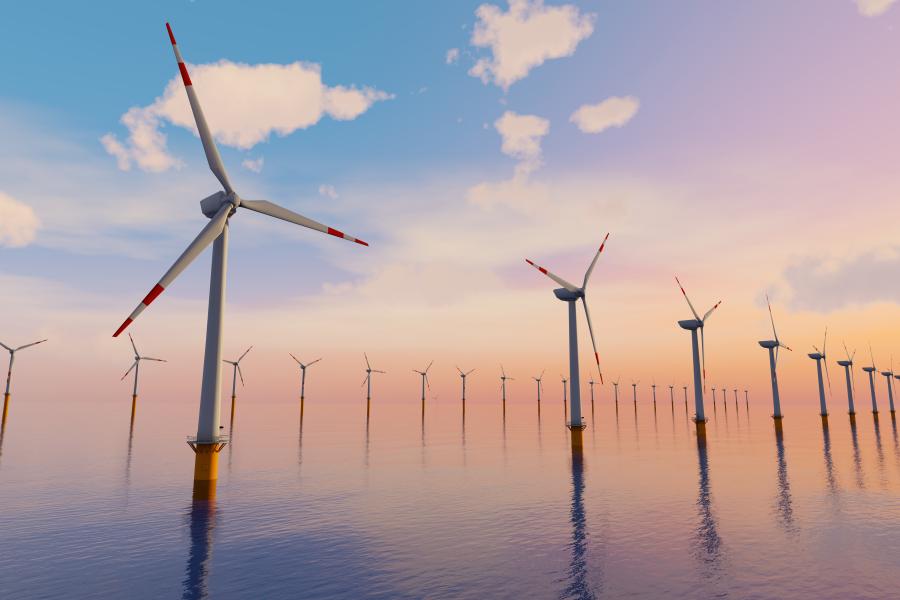Maryland's participation in a national center supporting offshore wind energy will be established by researchers from Johns Hopkins University's Ralph O'Connor Sustainable Energy Institute in partnership with Morgan State University and the State of Maryland's Maryland Energy Administration (MEA).
The U.S. Department of Energy's Academic Center for Reliability and Resilience of Offshore Wind, or ARROW, aims to expand the industry and provide greater opportunities for residents and businesses to participate in the growing clean energy economy.
The national center, which is receiving $1 million in funding from Maryland as well as further financial support from the Department of Energy's Wind Energy Technologies Office, will be jointly developed and implemented by JHU and Morgan State. It was established through ARROW and will be housed across both universities, working in key areas of education and research.
"This effort leverages partnerships with schools and entities that were initiated by ROSEI, JHU's new leader for sustainable energy. We are excited to work with Morgan State and MEA to bring more resources for offshore wind energy to the state of Maryland," said Ben Schafer, director of ROSEI and a professor of civil and systems engineering at the Whiting School of Engineering. "By being a member of this new national center, MEA, Hopkins, and Morgan State are announcing that we are in it for the long haul to make the energy transition work with offshore wind in Maryland."
The MEA financial input directly funds the Maryland institutional partners of ARROW and will lead to direct Maryland benefits. Supporting the new center was an easy choice to make for the MEA, says Director Paul Pinsky.
"This not only supports MEA's mission to promote clean, affordable, reliable energy and energy-related greenhouse gas emission reductions to benefit Marylanders in a just and equitable manner but also brings closer to fruition the state's renewable energy and emissions reduction goals," Pinsky said.
ARROW is a new $4.75 million DOE national center of excellence led by the University of Massachusetts-Amherst. The initiative, which will focus on workforce development, targeted research, and partnerships to embed equity in offshore wind development, has also received a matching commitment of $4.75 million from the Massachusetts Clean Energy Center, an equivalent of MEA in Massachusetts.
According to the U.S. Department of Energy, ARROW aligns with the Biden-Harris administration's clean energy targets: Deploying 30 gigawatts of offshore wind by 2030, transitioning to a 100% clean electricity grid by 2035, and achieving net zero emissions economy-wide by 2050.
"ARROW is more than doubled in impact beyond the DOE funding because of MassCEC and MEA, meaning the group can expand its goals and focus as a result," Schafer said. "It's tremendously exciting to get this kind of buy-in from two state governments. It shows that the government understands the importance of renewable energy moving forward, and how critical it is to pursue the clean energy transition."
ARROW's three primary goals include:
Empowering the next generation of U.S.-based offshore wind professionals. Not only does this include training for offshore wind professionals, but it will also enhance the ability of U.S. institutions to deliver comprehensive offshore wind education and establish global leadership in offshore wind education. The center will advance the education of 1,000 students over the initial five-year life of the center.
Innovating with impactful research for a reliable and resilient offshore wind system built on rigorous treatment of uncertainty. Research will focus on infrastructure, atmospheric and ocean conditions and marine and human ecology.
Engaging with communities to get input from the wide diversity of stakeholders who make up the offshore wind ecosystem. With Schafer serving as associate director of ARROW and faculty leading its three of its four research thrusts, ROSEI's role with ARROW goes well beyond the creation of the Maryland center.
Dennice Gayme, an associate professor of mechanical engineering, will spearhead a group focused on transmission and grid infrastructure planning for a resilient power grid. Julie Lundquist, who will join Johns Hopkins as a professor this summer from the University of Colorado, will help lead two groups: one aiming to improve offshore wind power output predictability and system reliability, and another focusing on power resource reliability through mesoscale ocean-atmosphere modeling.
Other ROSEI faculty affiliated with ARROW include Charles Meneveau, professor of mechanical engineering: Michael Shields, associate professor of civil and systems engineering; Ben Hobbs, professor of environmental health and engineering: Mahdi Mehrtash, assistant research professor in environmental health and engineering, and Yury Dvorkin, associate professor of civil and systems engineering and electrical and computer engineering.
In addition to JHU, Morgan State, MEA, UMass Amherst, and MassCec, the ARROW consortium includes Clemson University, Northeastern University, University of Massachusetts Dartmouth, University of Massachusetts Lowell, University of Puerto Rico at Mayagüez, Argonne National Laboratory, National Renewable Energy Laboratory and the Pacific Northwest National Laboratory.
Sanjay Arwade, director of ARROW and a professor of civil engineering at UMass Amherst, said "With the entire, extraordinary ARROW team we're excited to build upon 50 years of achievement in wind energy research and education and move the nation towards a clean and renewable energy future."
Posted in Science+Technology
Tagged engineering, whiting school








